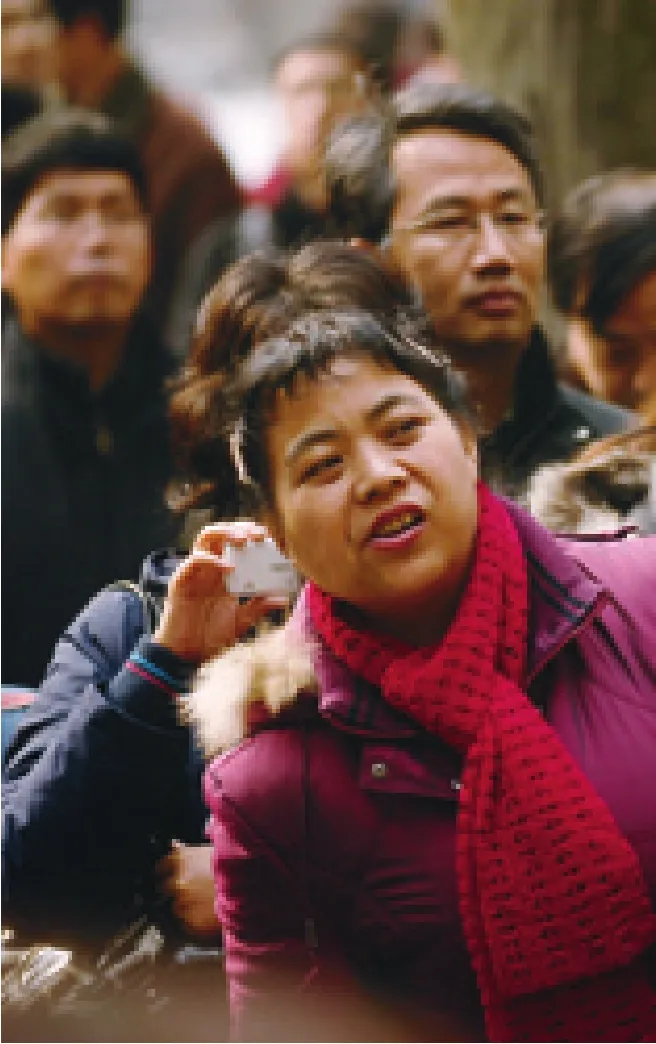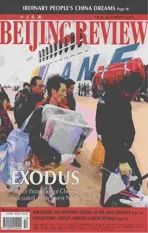Testing Reform
2011-03-05ByWANGHAIRONG
By WANG HAIRONG
Testing Reform
By WANG HAIRONG
Top universities tie in picking outstanding high school students

On February 26, a group of nine Chinese polytechnic universities, including Beijing Institute of Technology and Tianjin University, held a joint recruitment exam.
Two other consortiums of top Chinese universities each conducted a joint recruitment exam the previous weekend, just before the start of this spring semester in Chinese schools. One consortium consists of seven universities including Tsinghua University and the other consists of 13 universities including Peking University.
These written exams organized by university consortiums are supplement to annual national college entrance exam (NCEE), which had been the sole criteria for admission into China’s institutes of higher learning for decades.
Students passing the written exams will be given an opportunity to take part in interviews. Those meeting selection criteria of a university will be awarded scores, which can be added to the grade of the national exam when they apply for that university.
For instance, applicants to Tsinghua University accredited through the independent recruitment exam will be awarded a maxim score of 60 bonus points, said a staff member at the Admission Office of Tsinghua University.
Not just any graduating high school student can sit in these independent exams. The examinees were chosen by at least one university in a consortium, based on application materials submitted by the students and their high schools.
The number of students sitting in these independent exams was about 1 percent of that in the national exam, said China Youth Daily. Statistics from the Ministry of Education show 9.57 million students took NCEE in 2010.
Fresh reform
Independent college entrance exams organized by university consortiums are part of Chinese universities’ efforts to select students based on their own criteria.
“The exam organized by the consortium represented by Tsinghua University primarily assesses a student’s creativity, imagination, judgment and learning ability, rather than examination skills gained through repeated drilling,” said Yu Han, Director of Tsinghua University’s Admission Office.
The independent recruitment exam was more difficult than NCEE, Yu said. He believes the test can reveal a student’s academic strength and weakness, so that the school can better evaluate the student’s potential in a specific field, and admit students based on their performance in one or a few subjects.
In addition to the aggregate score and scores in individual subjects, students would get an in-depth analysis of their grades in every subject, so that they could plan their future studies accordingly, Yu said.
Conventionally, university applicants in China are first ranked by their aggregate NCEE score. Cut-off points for admission into different tiers of universities are then set in light of planned admission rates. After that, the cut-off point for a university is determined by ranking its applicants according to its recruitment quota.
Admission solely based on aggregate NCEE score has been criticized. “NCEE is too simplistic to evaluate a student comprehensively,” said Meng Qian, a former director of Tsinghua University’s Admission Office.
NCEE could only show whether a student meets the requirements for high-school education, but it told little about whether the student has the research potential desired by a university, Meng said.
Moreover, NCEE could not exhibit a student’s characteristics, whereas different universities have different education goals and prefer different types of students, said Tao Zhengsu, Director of the Admission Office in Shanghai Jiao Tong University.
NCEE is also criticized for not being able to adequately measure the ability of students who excel in some but not all subjects. Xu Ziwen, who has taught graduating high school students in Liuan No.1 Middle School in Anhui Province for 20 years, told China News Weekly he had seen quite a number of students with exceptional talent eliminated by the NCEE.

Five to six years ago, Xu was very impressed by a student’s written skills. Xu expected the student to be a great writer, yet to his disappointment, the student, having tried twice, failed to score high enough in NCEE to enter a good university.
To solve these problems, in 2003, the Ministry of Education allowed 22 prestigious universities to select 5 percent of their freshmen by using their own criteria in combination with NCEE score. Now 80 universities across the country have been granted the same right.
These universities can award bonus scores to applicants based on interviews and recommendations of high school principals. The bonus scores can be added to the applicants’ NCEE score.
A circular issued by the Ministry of Education regarding this college admission reform says the purpose of the reform is to recruit students with creative potential, special talent and well-rounded qualifications.
Some talented students have benefited from the independent recruitment policy. Jiang Fangzhou, a teenage writer who started writing since 7 years old and has published nine pieces of work including several novels, was accepted into the Tsinghua University in 2008 thanks to 60 bonus points earned through independent recruitment.
Every year, about 15,000 students pass independent screenings held by eligible universities in China, said Ke Bingsheng, President of China Agricultural University. He estimated approximately 5,000 students would not be able to enter the school they wanted to go to if not for the independent recruitment policy, he said.
Some universities such as Fudan University in Shanghai and Ocean University of China in Qingdao, Shandong Province, say the system is finding better recruits.
A study by Fudan University shows that, compared with students admitted in 2008 solely based on aggregate NCEE score, students admitted in the same year through independent selection are more self-driven in their study, more active in extracurricular activities, and have a higher grade point average, a measure of how well a student is doing in his or her academic studies, in the first year in university and clearer plan for the future.
Ocean University of China has also compared students recruited independently and those recruited solely based on NCEE score. Its findings are similar to that of Fudan University, according to report by China News Weekly.
Controversial exams
The reform has also created problems as students interested in a number of universities have to take several different exams.
To relieve students from such pressures, the National Outline for Medium- and Long-term Education Reform and Development (2010-20) released in July 2010 encourages universities to organize joint recruitment exams.
Joint recruitment exams were an important step in the reform of China’s college entrance exam system, said Lao Kaisheng, an expert on education policy at Capital Normal University in Beijing.
Joint recruitment exams are usually administered more professionally than exams organized by a single university, admission experts say. The consortium represented by Tsinghua University commissioned a professional testing agency to design and grade test questions and supervise the exam, Meng said.
Not everyone welcomes joint recruitment exams held by university consortiums.
Ocean University of China, for example, does not require applicants to sit in any written independent exam, and it has not joined any university consortium for independent recruitment.
Lu Xiongwen, Dean of Fudan University’s School of Management, said,“Admission based on joint recruitment exams ‘betrays’ education reform because students are still only selected by their test scores.”
The independent recruitment policy meant to let universities find students matching their education style and philosophy, but joint recruitment exams were nothing more than NCEE on a smaller scale, Lu said.
President Ke of China Agricultural University doubted joint recruitment exams are better designed than NCEE to identify students with more well-rounded ability and creativity.
“If that is true, why not simply make questions in joint recruitment exams NCEE questions?” Ke said.
As to the saying that joint recruitment exams give more chances to students who fail to show their best during NCEE, Ke said students eliminated by one NCEE could retake the exam next year. “The students’chance to show their best can be improved if NCEE is held more frequently,” he said.
Some people question the fairness of such joint exams as well as the independent recruitment policy, accusing some prestigious universities of only allocating the admission quota under the independent recruitment policy to top or nearby middle schools.
Wu, a parent from Shayang County in Hubei Province who declined to give his full name, said, “University consortiums usually require students to be winners of national or provincial competitions, whereas students in rural or remote areas are less likely to participate and win these awards, so they cannot sit in such joint recruitment exams.”
Some parents even try to use their connections to get more chances for their children. An anonymous director of the admission office in a university in Heilongjiang Province told China Youth Daily many people flocked to his office and lobbied him to give special treatment to certain students during the independent recruitment process.
Students and teachers also need to spend time preparing application materials and taking exams.
“It takes time for students to prepare for independent recruitment exams, and moreover, that distracts them from preparation for NCEE as they cannot relax for several months,” Yang Bin, a teacher of graduating high school student in Haian Middle School in Jiangsu Province.
“From last December when universities released their independent recruitment policies, students began to agitate,” Yan said.
The Shanghai Academy of Educational Sciences, in cooperation with other education research institutes, recently conducted a survey on the impacts of independent recruitment on high school education in Shanghai and Jiangsu and Zhejiang provinces.
According to a report in China Education Daily, 57.8 percent of responding students said independent recruitment had increased their pressure and course load, while 46.7 percent of their teachers said it had increased their teaching load and work pressure.
The exams are often a challenge to both the students’ minds and bodies.
In the exam of the consortium represented by Peking University, students had to sit for eight to 12 hours on exam day depending on which universities they apply to.
Some students are reported to take several such exams because they want to try different university consortiums.
